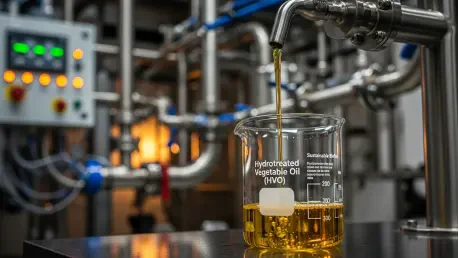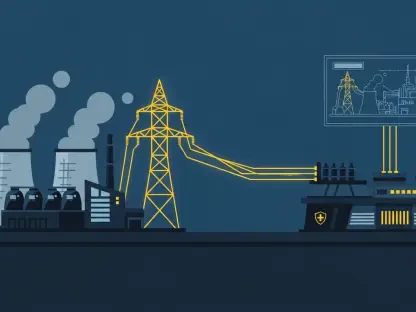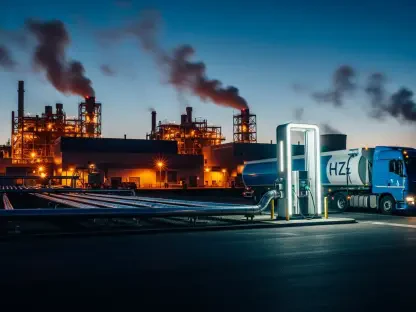In a world still heavily dependent on diesel vehicles for transportation and industry, the pressing need for sustainable fuel alternatives has never been more critical, especially as global carbon emissions continue to climb and environmental regulations tighten. Renewable diesel, particularly Hydrotreated Vegetable Oil (HVO), emerges as a vital bridge between traditional fossil fuels and the long-term goal of full electrification. This biofuel, derived from waste plant matter, offers a direct substitute for conventional diesel while slashing emissions by up to 90%. The focus here is on Certa’s remarkable expansion of HVO availability in Ireland, the surging demand among diesel vehicle owners, and the wider implications for the renewable fuel industry as a practical step toward sustainability.
The Surge of Renewable Diesel: HVO’s Expanding Presence
Market Demand and Adoption Patterns
The demand for HVO in Ireland has seen a significant uptick, driven by diesel vehicle owners seeking greener alternatives without needing to overhaul their engines. This renewable fuel serves as a seamless replacement for traditional diesel, providing substantial environmental benefits. Statistics reveal that diesel and gasoline vehicles account for 84% of the 2.14 million cars on Irish roads, with 17% of new car sales this year still being diesel-powered, highlighting a persistent reliance on such fuels.
Certa, a key player in Ireland’s fuel market, has capitalized on this trend with rapid growth in HVO distribution. Within a short span, the company has established 25 HVO sites across 17 counties, with 15 of these added in just the last eight months. This swift rollout underscores the momentum behind renewable diesel as a viable option for reducing carbon footprints in a market hesitant to fully embrace electric vehicles (EVs).
The environmental impact of this shift cannot be overstated. With HVO capable of cutting emissions by up to 90%, its adoption offers an immediate way to address climate concerns while catering to the practical needs of diesel-dependent sectors. This trend reflects a broader movement among consumers and businesses prioritizing sustainability without sacrificing operational efficiency.
Practical Implementation: Certa’s Targeted Expansion
Certa’s strategic deployment of HVO sites provides concrete examples of how this trend is taking shape on the ground. A standout case is the fully dedicated HVO station in Liffey Valley, launched at a cost of €1 million, setting a benchmark for renewable fuel infrastructure. Another milestone is the 25th site in Portlaoise, further extending access to this biofuel across diverse regions.
To facilitate consumer adoption, Certa and its partner Emo forecourts have introduced user-friendly features, such as distinct pink nozzles for HVO, differentiating it from the black nozzles for diesel and green for gasoline. This simple yet effective measure helps prevent confusion and encourages drivers to make the switch with confidence. Such innovations play a crucial role in normalizing the use of alternative fuels.
As Ireland’s largest HVO supplier among its 54 forecourt locations, Certa demonstrates leadership in renewable fuel distribution. This positioning not only meets growing demand but also sets a precedent for other fuel retailers to follow, amplifying the real-world impact of HVO in reducing reliance on fossil fuels across the country.
Industry Insights on HVO’s Sustainability Contribution
Expert perspectives shed light on the pivotal role of HVO in the energy transition. Orla Stevens, Managing Director of Certa Ireland, emphasizes the company’s dedication to expanding HVO availability, viewing it as a straightforward option for diesel drivers looking to lower their environmental impact. Her insights point to a deliberate strategy of making sustainability accessible to everyday consumers.
Stevens also highlights a noticeable shift in consumer behavior, with drivers increasingly choosing HVO where it’s offered. This preference is fueled by a rising environmental consciousness, coupled with reluctance to adopt EVs due to high costs and inadequate charging infrastructure. Such observations underline the importance of interim solutions like HVO in meeting current needs.
The consensus within the industry aligns with this view, recognizing HVO as a critical tool for balancing immediate emission reduction goals with the long-term vision of net-zero. By providing a practical alternative, renewable diesel addresses the gap for those unable to transition to electric options, ensuring progress toward sustainability without leaving key sectors behind.
Renewable Diesel Horizons: Potential and Obstacles
Looking ahead, the scalability of HVO as a sustainable fuel holds immense promise, with Certa planning to add five more sites and upgrade its entire network in the coming year. This ambition reflects confidence in the fuel’s ability to meet growing demand while supporting broader decarbonization efforts. The trajectory suggests a robust future for renewable diesel in Ireland and beyond.
HVO’s role extends to bridging gaps for diesel-reliant industries and individual consumers facing barriers to EV adoption, such as prohibitive costs and limited charging facilities. For many, this biofuel offers a pragmatic way to reduce emissions without the immediate need for significant investment or lifestyle changes, making it a cornerstone of the transition to greener transport.
However, challenges remain on the horizon, including potential supply constraints in HVO production due to raw material limitations and competition with other renewable fuels. Despite these hurdles, the outlook remains positive, as the push for emission reductions and market expansion continues to drive innovation and investment in this space, ensuring HVO’s relevance in the sustainability landscape.
Final Reflections: Charting a Sustainable Path
Looking back, Certa’s expansion to 25 HVO sites marked a significant milestone in addressing the demand for renewable diesel alternatives, driven by environmental concerns and barriers to EV adoption. The environmental benefits of HVO, coupled with strong consumer uptake, underscored its value as a practical solution in the automotive and fuel retail sectors during a critical period of transition.
Moving forward, stakeholders across industries should prioritize investment in renewable fuel infrastructure like HVO to accelerate emission reductions. Collaborative efforts between policymakers, fuel providers, and technology developers can address supply challenges and enhance accessibility, ensuring that sustainable options remain within reach for all.
Ultimately, the journey toward a net-zero future requires actionable steps today. Supporting the growth of renewable diesel through incentives, innovation, and public awareness can pave the way for broader adoption, setting a foundation for more transformative changes in the years ahead.









